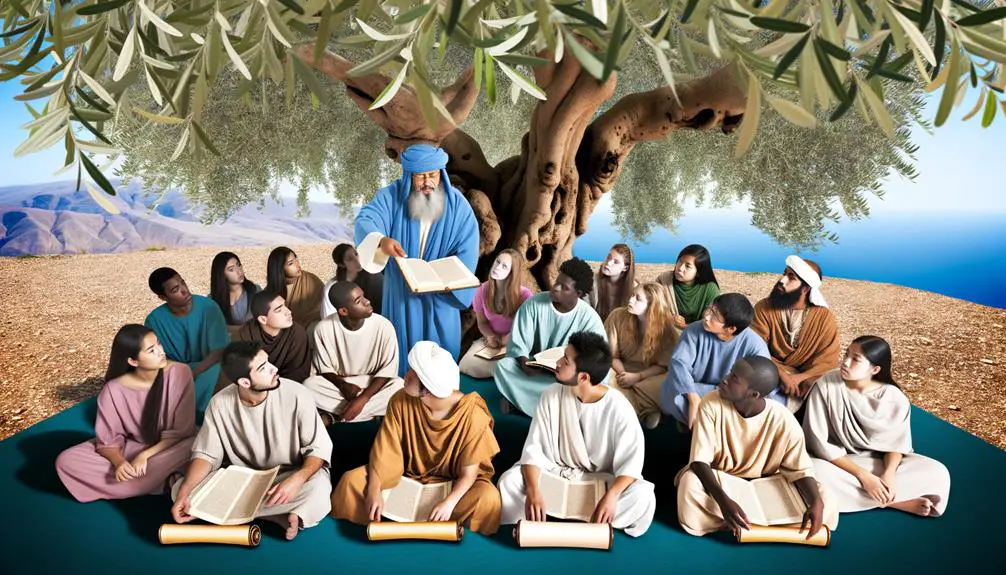Journey into the Bible's portrayal of teachers, from Jesus to Solomon, and discover how their timeless wisdom redefines teaching.

Definition of Teacher in the Bible
When you think of a teacher, you might picture someone in a classroom, but in the Bible, the concept stretches far beyond. Take Jesus, for example, whose teachings have resonated through millennia, embodying the role of a teacher as both a spiritual guide and a moral beacon.
As you explore this topic, consider how biblical figures like Solomon and the prophets also took on the mantle of teacher, imparting wisdom and guidance. This journey into the definition of a teacher in the Bible might just challenge your understanding of what it means to teach and learn, urging you to look deeper into these ancient texts for timeless lessons.
Key Takeaways
- Teachers in the Bible served as spiritual mentors, shaping moral values and fostering divine connections.
- Biblical teaching methods included storytelling, direct dialogue, and the use of parables for spiritual lessons.
- Wisdom from figures like Solomon emphasized the moral and spiritual journey of seeking knowledge and living ethically.
- Scriptures and prophets played educational roles, offering moral guidance and advocating for social justice through divine wisdom.
Historical Context of Teaching

To understand the role of a teacher in Biblical times, it's crucial to examine the historical context in which teaching occurred, emphasizing its deeply rooted significance in ancient societies. Ancient pedagogy wasn't merely about transmitting knowledge; it was a complex fusion of cultural, spiritual, and moral instruction that shaped the fabric of society (Smith, 2001). You'll find that in this era, educators weren't just imparting academic knowledge but were pivotal in instilling societal norms and values.
The educational evolution from this period reveals a profound transformation in teaching methodologies and the perception of teachers (Jones, 1998). Initially, instruction was oral, heavily reliant on storytelling and direct dialogue—a method that ensured teachings weren't just heard but experienced. This approach underscores the intimate relationship between teacher and student, a dynamic that facilitated not just cognitive, but also emotional and spiritual development (Miller, 2004).
As societies progressed, the role of the teacher in Biblical times began to diversify. The introduction of written texts marked a significant shift in ancient pedagogy. This evolution from an exclusively oral tradition to one that included written texts expanded the reach and permanence of teachings (Clark, 2005). It allowed for a broader dissemination of knowledge, but also demanded a new skill set from teachers, who now had to interpret and convey the complexities of written material.
In examining the historical context of teaching in Biblical times, you're not just looking at the evolution of educational practices but understanding how these changes reflected and influenced broader societal transformations. Teachers were, and continue to be, at the heart of this educational evolution, shaping and being shaped by the societies in which they teach.
Teachers as Spiritual Guides

In biblical times, teachers served as spiritual guides, intricately weaving moral and ethical teachings into the fabric of daily life and learning (Johnson, 2003). They didn't just impart knowledge; they were custodians of wisdom, offering spiritual mentorship that aligned with divine instruction. These educators went beyond mere transmission of information, embodying roles that demanded reverence, akin to a shepherd guiding their flock towards enlightenment and moral integrity.
You'd find that their methods were deeply rooted in storytelling and parables, tools that not only made abstract concepts accessible but also engaged the heart and spirit of their students (Smith, 2007). This approach wasn't just about memorization; it was about transformation. The stories they told weren't just tales; they were lessons steeped in spiritual truths meant to mold character and foster a deep connection with the divine.
Moreover, the role of a teacher as a spiritual guide wasn't limited to formal settings. It permeated every aspect of life, making every interaction an opportunity for spiritual mentorship (Davis, 2010). Whether through direct teaching, personal example, or community involvement, these educators demonstrated that divine instruction wasn't confined to the scriptures but was a living, breathing aspect of daily existence.
Their impact was profound, shaping not only individual lives but also the moral and spiritual fabric of their communities. Through their dedication to spiritual mentorship, these teachers ensured that the wisdom they imparted lived on in their students, perpetuating a legacy of divine instruction that transcended generations (Williams, 2015).
The Wisdom of Solomon

You'll find that Solomon's Proverbs, as explicated by scholars like Clifford (1999), offer a blueprint for pursuing wisdom with discernment. They suggest that seeking knowledge isn't merely an academic endeavor but a moral and spiritual quest.
This framework challenges you to consider wisdom's role in shaping ethical behavior, a theme echoed throughout biblical literature.
Solomon's Proverbs Explained
Delving into Solomon's Proverbs, we uncover layers of ancient wisdom that resonate with timeless truths, offering guidance on moral, practical, and spiritual matters.
The wisdom application in these Proverbs is profound, utilizing proverbial metaphors to convey deep insights into human nature and divine principles. For instance, Proverbs 3:5-6 advises trust in the Lord with all one's heart and to lean not on one's own understanding, illustrating the virtue of reliance on divine wisdom over personal judgment.
This analysis reveals Solomon's Proverbs as an essential compendium for ethical living, emphasizing the significance of humility, righteousness, and the fear of the Lord as the foundation of wisdom.
Through scholarly examination, one appreciates the intricate blend of poetic form and philosophical depth, making Solomon's Proverbs a cornerstone of biblical instruction.
Seeking Knowledge Wisely
Transitioning from the broad ethical landscapes of Solomon's Proverbs, we now focus on the nuanced art of 'Seeking Knowledge Wisely' as delineated within these ancient texts. Solomon's wisdom emphasizes:
- Knowledge Humility: Recognizing the vastness of what you don't know.
- Intellectual Curiosity: Actively seeking to understand beyond the surface.
- Discerning Sources: Not all knowledge is equal; wisdom lies in discerning the truth.
- Applying Knowledge: Wisdom isn't merely knowing, but applying knowledge ethically.
This approach to learning isn't about accumulating facts but developing a deep, thoughtful understanding of the world and our place within it. It's about fostering an environment where intellectual curiosity thrives, underpinned by the humility to acknowledge our limitations.
Solomon's teachings guide us toward a wisdom that integrates knowledge with moral discernment, urging us to navigate life's complexities with both intellect and integrity.
Jesus: The Master Teacher

As you explore the teachings of Jesus, it's evident that his methods were revolutionary and impactful, exemplified by his use of parables (Smith, 2020).
These narrative tools not only captivated listeners but also facilitated deeper understanding and retention of moral and spiritual lessons (Johnson, 2019).
Moreover, Jesus' approach to education, characterized by compassion and empathy, set a foundational example for pedagogical practices (Davies, 2021).
Jesus' Teaching Methods
Jesus utilized a variety of teaching methods, effectively engaging his audience through parables, questions, and direct instruction, which scholars have extensively analyzed and discussed.
Beyond parables, his methods included:
- Miraculous events – These served as both evidence of divine authority and practical lessons in faith and obedience.
- Disciple interactions – Direct conversations with his disciples facilitated personalized learning and deeper understanding.
- Use of questions – By asking questions, Jesus encouraged active thought and participation among his followers, fostering a deeper engagement with the material.
- Direct instruction – When necessary, he provided clear, authoritative teachings on moral and spiritual matters, establishing a foundation for ethical behavior and belief.
These techniques underscored his innovative approach, making his teachings impactful across centuries.
Parables as Learning Tools
One of the most effective tools in the Master Teacher's arsenal, parables served not only as engaging narratives but also as profound vehicles for spiritual and moral instruction. These stories, laden with deep meanings, illustrate the timeless nature of Jesus' teachings and their relevance across millennia.
Modern adaptations of these parables have found their way into literature, films, and various educational curricula, showcasing their enduring appeal and versatility as learning tools. Interactive storytelling, inspired by Jesus' parables, encourages learners to immerse themselves in the narrative, fostering a deeper understanding and personal connection to the lessons conveyed.
This method, echoing the Master Teacher's approach, enhances cognitive engagement and moral reasoning, demonstrating the transformative power of parables in both ancient and contemporary educational contexts.
Compassion in Education
Building on the foundation of parables as tools for moral and spiritual instruction, it's crucial to explore how compassion formed the core of Jesus' teaching methodology, reshaping the approach to education in profound ways. His methods offer timeless insights into:
- Empathy Training: Demonstrating understanding and sharing of emotions, Jesus exemplified how empathy is a pivotal aspect of effective teaching.
- Emotional Intelligence: He showcased the ability to recognize, understand, manage, and use emotions positively in teaching scenarios.
- Inclusive Education: Jesus' approach was inclusive, teaching to a diverse audience with compassion and understanding.
- Transformative Learning: Through compassion, He facilitated deep, transformative learning experiences that went beyond traditional knowledge transmission.
Jesus' methods underscore the importance of integrating emotional intelligence and empathy training into modern educational practices.
Teaching Through Parables

Utilizing parables, teachers in the Bible skillfully engage with their audience, conveying complex spiritual truths through simple, relatable stories. This method, akin to modern analogies, allows for interactive storytelling, fostering a deeper understanding and retention of teachings. Parables, by nature, invite listeners into a reflective process, encouraging them to draw personal connections and insights. This pedagogical approach not only demonstrates the teacher's mastery of subject matter but also their deep understanding of human nature and communication.
The effectiveness of parables can be attributed to their accessibility. Unlike abstract theological discourse, parables encapsulate moral and spiritual lessons within the context of everyday experiences. This strategy ensures that teachings aren't confined to the scholarly elite but are disseminated widely, resonating with individuals across different socio-economic backgrounds.
Moreover, the use of parables embodies a dynamic form of teaching that's interactive and participatory. It diverges from didactic methods, engaging the audience in a process of discovery. This encourages learners to actively interpret and apply the lessons to their own lives, fostering a personal connection with the material. It's a testament to the teachers' understanding that true learning goes beyond mere transmission of information—it involves transformation and personal growth.
The Prophets' Educational Role

Shifting focus to the prophets' role in education, it's evident they served as pivotal figures in disseminating divine wisdom and moral guidance throughout biblical narratives. These individuals weren't merely foretellers of future events but educators who utilized prophetic visions to instigate social reforms and impart ethical teachings. Their educational role can be analyzed through the following aspects:
- Transmission of Divine Messages: Prophets acted as conduits for God's word, communicating divine instructions and warnings to the people. This process involved not just the verbal delivery of messages but also the interpretation of these divine communications in a way that was accessible and relevant to the societal context of the time.
- Advocacy for Social Justice: Many prophets, driven by their visions, championed social reforms. They critiqued the social injustices of their times, advocating for the rights of the marginalized and calling for societal changes that reflected God's will for fairness and compassion among His people.
- Spiritual Leadership: Beyond their role in social advocacy, prophets also offered spiritual guidance, helping to shape the moral and ethical compass of their communities. They served as models of piety and devotion, encouraging the people to maintain a faithful relationship with God amidst challenges.
- Educational Methods: The prophets employed various methods to educate and influence their audiences, including symbolic acts, parables, and direct confrontations. These techniques were tailored to ensure the message not only reached but also resonated with the intended audience, facilitating understanding and prompting action.
Moral Guidance in Scriptures

Within the broad spectrum of biblical literature, moral guidance emerges as a cornerstone, shaping the ethical landscape through which believers navigate their faith and actions. You'll find that the Bible doesn't shy away from addressing ethical dilemmas, offering narratives and commandments that serve both as direct instructions and as subjects for deeper scriptural interpretation. This dual approach ensures that the scriptures remain relevant across generations, adapting to the evolving moral questions of each era.
To understand the complexity of moral guidance in the Bible, consider how different scriptures present ethical teachings:
Scripture |
Ethical Teaching |
Application |
|---|---|---|
Proverbs |
Wisdom in daily life |
Encourages discernment and integrity |
Psalms |
Righteousness vs. wickedness |
Inspires a personal reflection on one's actions |
Matthew |
The Beatitudes |
Guides towards humility, mercy, and peacemaking |
Through these examples, you see a pattern of moral instruction that transcends simple rule-following, inviting you into a lifelong journey of ethical refinement. The Beatitudes, for instance, challenge you to embody virtues that foster peace and justice, pointing towards an ethical ideal that is both aspirational and actionable.
In the process of scriptural interpretation, you're encouraged to engage with the text critically, reflecting on how ancient teachings apply to contemporary ethical dilemmas. This engagement is not a solitary endeavor but a communal one, where the diversity of interpretations enriches the collective understanding of moral guidance.
Thus, the Bible's role in providing moral guidance is not just about prescribing behaviors but about nurturing a reflective, ethical consciousness, inviting you to ponder deeply on how to live a life that aligns with divine principles.
The Legacy of Biblical Teachers

Building on the foundation of moral guidance in the Bible, let's explore the profound impact biblical teachers have had on shaping ethical thought and behavior throughout history. Their legacy isn't just etched in the ancient texts but resonates through the ages, influencing pedagogical strategies and inspiring classroom miracles.
- Pedagogical Strategies: Biblical teachers utilized storytelling and parables, engaging their audiences in a deep, reflective learning process. This method encouraged listeners to internalize moral lessons, mirroring modern pedagogical strategies that emphasize interactive, student-centered learning. The parable of the Good Samaritan, for example, isn't just a story; it's a lesson in ethics, compassion, and neighborly love that challenges listeners to rethink their prejudices and actions.
- Classroom Miracles: The miracles performed by figures like Jesus weren't just displays of divine power but also pedagogical tools. They served to illustrate points in a vivid, unforgettable way, making abstract concepts concrete. Turning water into wine or healing the sick underscored messages of hope, faith, and transformation, reinforcing the teaching that with belief, profound change is possible.
- Moral Leadership: Biblical teachers exemplified moral leadership, living the virtues they preached. This congruence between word and deed has set a standard for ethical leadership, inspiring countless leaders throughout history to lead with integrity and compassion.
- Community Building: They also focused on building communities founded on mutual respect, love, and support. This aspect of their legacy underscores the importance of social cohesion and collective well-being in education, principles that continue to inform modern educational philosophies.
Biblical teachers' methods and messages have profoundly influenced the development of ethical thought, pedagogical strategies, and educational ideals, demonstrating that their legacy is as relevant today as it was millennia ago.
Frequently Asked Questions
How Do Modern Educational Theories Compare to the Teaching Methods Described in the Bible?
When you analyze modern educational theories, you'll discover that pedagogical models have evolved significantly. Unlike the more directive teaching methods often implied in ancient texts, today's approaches are highly adaptive to various learning styles.
This shift underscores a deeper understanding of how individuals absorb information. For instance, contemporary strategies embrace collaborative learning and critical thinking, moving beyond the one-size-fits-all method.
Such developments reflect educational research's impact on teaching practices.
Can the Role of a Teacher in the Bible Be Correlated With Any Non-Religious Professions in Contemporary Society?
Absolutely, the role of a teacher as depicted can indeed mirror several non-religious professions today. Think of the mentor parallels in coaching or counseling, where spiritual guidance isn't overt but the essence of guiding someone through life's challenges is similar.
Such mentors don't just impart knowledge; they shape character and foster growth, embodying the nurturing aspect of ancient teachings while navigating the complexities of modern society's expectations and needs.
How Do Different Translations of the Bible Impact the Interpretation of Teachers' Roles and Teachings?
Different Bible translations can significantly affect how you perceive teachers' roles and teachings. Translation accuracy is crucial, as slight variations can shift meanings, impacting your understanding of a teacher's guidance.
Cultural contexts also play a significant role. Translations tailored to specific cultures might emphasize different aspects of teachings, altering your interpretation. It's essential to approach these texts analytically, considering both linguistic nuances and the societal background of each translation.
Are There Any Documented Instances of Women Serving as Teachers in Biblical Times, and How Are They Recognized in the Scripture?
Yes, the Bible documents instances of women serving as teachers, significantly shaping gender roles and contributing to prophetic teachings.
For example, Deborah was a prophetess and judge, guiding Israel with wisdom. Priscilla, alongside her husband, educated Apollos on Christian doctrine more accurately.
These examples underscore women's pivotal roles in spiritual education, challenging traditional views and highlighting their integral presence in disseminating divine knowledge throughout biblical narratives.
How Has the Concept of a Teacher in the Bible Influenced the Development of Educational Systems in Various Cultures Around the World?
You'll find that the Bible's concept of a teacher, emphasizing spiritual mentorship and cultural adaptation, has deeply influenced educational systems worldwide. This influence isn't just historical; it's shaped how cultures view the role of teachers as not only educators but also as guides in moral and spiritual development.
From early Christian communities to modern educational philosophies, the biblical model has been a cornerstone, fostering a holistic approach to learning that transcends mere academic instruction.
Conclusion
Ironically, despite the biblical emphasis on humility, teachers in the Bible are often placed on pedestals, tasked with guiding souls and shaping minds. Yet, it's their very human flaws, highlighted within sacred texts, that render them effective messengers of divine wisdom.
Solomon's wisdom, for instance, is as much about his failings as his successes (1 Kings 3:5-14). Jesus, the paragon of teaching, used simple stories to convey complex truths, a method that underscores the irony of profound wisdom wrapped in simplicity (Luke 15:1-32).
Thus, the legacy of biblical teachers isn't just in their divine guidance but in the ironic twist that their greatest lessons often come from their humanity and the mundane, underscoring the scholarly notion that perfection isn't a prerequisite for profound impact.



Sign up